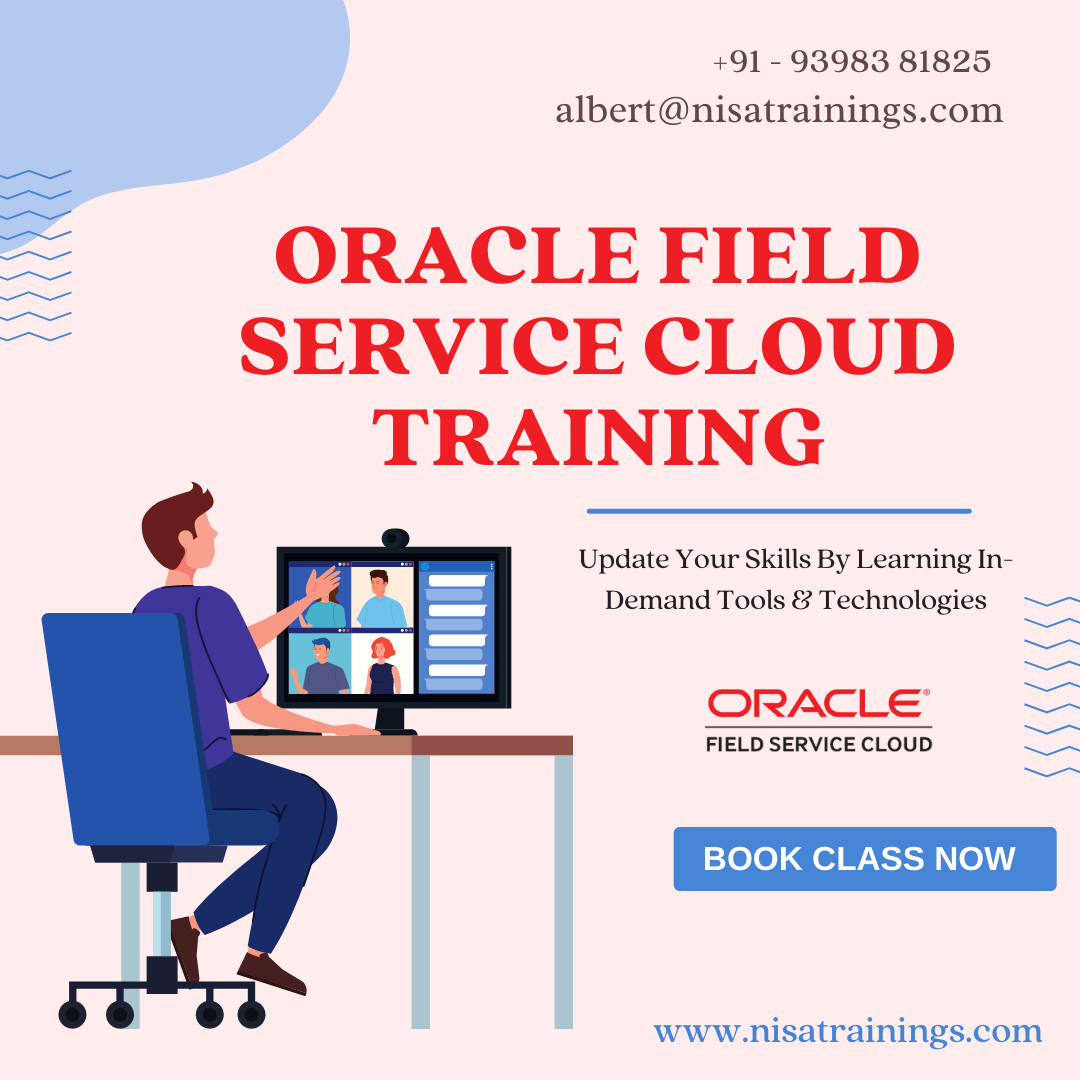Oracle Field Service Cloud Training
Oracle Field Service Cloud Training is customer communication and field service-based cloud solution and a part of Oracle Service Cloud. This regularly collects data from the area and identifies the performance of future events to reduce organizational costs and increase efficiency.
Our Oracle Field Service Cloud online course deals with:
- Capacity Management.
- Routing.
- Core Manage.
- Mobility.
- Smart location.
- Field Collaboration.
- Customer Communication and Many more.

Why should you choose Nisa For Oracle Field Service Cloud Training?
Nisa Trainings is the best online platform for conducting one-on-one interactive live sessions with a 1:1 student-teacher ratio. You can gain hands-on experience by working on near-real-time projects under the guidance of our experienced faculty. We support you even after the completion of the course and are happy to clarify your doubts anytime. Our teaching style at Nisa Trainings is entirely hands-on. You’ll have access to our desktop screen and will be actively conducting hands-on labs on your desktop.
Job Assistance
If you face any problem while working on Oracle Field Service Course, then Nisa Trainings is simply a Call/Text/Email away to assist you. We offer Online Job Support for professionals to help them and to solve their problems in real-time.
The Process we follow for our Online Job Support Service:
- We receive your inquiry for Online Job Support.
- We will arrange a telephone call with our consultant to grasp your complete requirement and the tools you’re using.
- If our consultant is 100% confident in taking up your condition and when you are also comfortable with our consultant, we will only agree to provide service. And then you have to make the payment to get the service from us.
- We will fix the timing for Online Job Support as mutually agreed by you and our consultant.
Oracle Field Service Training
Duration: 25 Hours
Timings: Weekdays (1-2 Hours per day) [OR] Weekends (2-3 Hours per day)
Training Method: Instructor Led Online One-on-One Live Interactive Sessions
COURSE CONTENT :
1. Introduction to Oracle Field Service Cloud
- Overview of the application and its features.
- Key benefits of using Oracle Field Service Cloud for managing field operations.
- User roles and responsibilities within the platform.
2. System Setup and Configuration
- How to configure the system for your organization’s specific needs.
- Setting up locations, users, and teams.
- Configuring work types, service areas, and other core components.
3. Scheduling and Dispatching
- How to create and manage service requests and work orders.
- Overview of scheduling algorithms and optimization.
- Dispatching field technicians based on location, skills, and availability.
- Managing schedules and handling conflicts.
4. Field Technician Interface
- How field technicians interact with the system using mobile apps.
- Managing tasks and job details on mobile devices.
- Completing work orders and updating status in real-time.
5. Work Order Management
- Creating, modifying, and tracking work orders.
- Managing and updating job statuses.
- Handling priority cases, escalations, and job completions.
6. Service Level Agreement (SLA) Management
- Understanding SLAs within Oracle Field Service Cloud.
- Configuring and monitoring SLAs for timely service delivery.
- Handling SLA breaches and exceptions.
7. Analytics and Reporting
- Using built-in reporting tools to track performance metrics.
- Generating reports for field performance, technician efficiency, customer satisfaction, etc.
- Customizing reports and dashboards to meet business requirements.
8. Advanced Features and Customization
- Customizing workflows, notifications, and alerts.
- Setting up and using advanced features such as predictive scheduling and IoT integrations.
- Integration with other Oracle or third-party systems (e.g., ERP, CRM).
9. Troubleshooting and Support
- Common issues encountered during daily use and their solutions.
- How to request support and access troubleshooting resources.
- Best practices for maintaining and optimizing the system.
10. Best Practices and Use Cases
- Real-world scenarios and best practices for maximizing the use of Oracle Field Service Cloud.
- Key performance indicators (KPIs) to track and improve field service operations.
- Case studies to demonstrate effective implementation and usage.
What I will learn?
- Configure the main components of OFSC, including the Core Manage and Mobility Cloud Services.
- Implement security and create user accounts.
- Define and apply work skills and conditions, work zones, and calendar settings.
- Configure custom properties and various screen layouts for different user types.
- Configure routing plans to meet critical business goals.
- Use REST and SOAP APIs to exchange data between host systems and Oracle Field Service Cloud.
- Integrate OFSC with other Oracle applications.

